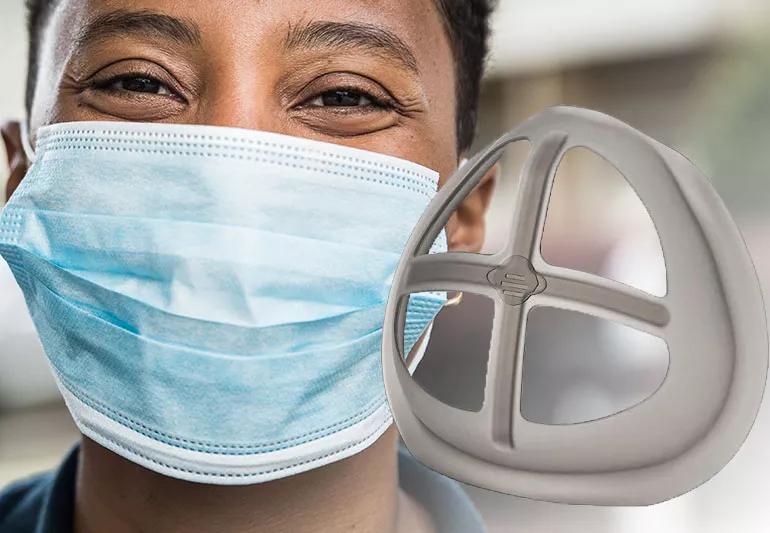They’re a hot seller, but a proper fit is critical

Image content: This image is available to view online.
View image online (https://assets.clevelandclinic.org/transform/59bc9316-6173-4fd9-bff5-3e7b16ac56df/faceBracket-1252473589-770x553-1_jpg)
Face mask bracket
You don’t need to settle for a plain surgical mask in 2020. You can flaunt a face mask in any color or pattern you want.
Advertisement
Cleveland Clinic is a non-profit academic medical center. Advertising on our site helps support our mission. We do not endorse non-Cleveland Clinic products or services. Policy
But even the cutest face mask can smudge your makeup and feel stuffy. It may even cause acne breakouts, aka maskne. Who wants smeared lipstick and blemishes? Enter the newest accessory for your necessary accessory: the face mask bracket.
Some people swear by mask brackets, and they’re a big seller online. But do they really serve a purpose? And more importantly, are they safe to use?
Donald Dumford, MD, infectious disease specialist, has some insight on this trending item and whether it’s a good idea to invest in one.
Mask brackets are cage-like frames you wear under your mask. They’re usually made of plastic or silicone. Mask bracket companies claim they make face masks more comfortable by:
We don’t know how mask brackets affect the transmission of respiratory droplets (those particles we’re all trying to keep to ourselves during the pandemic). “No studies have looked at mask brackets and how they affect the transmission of the coronavirus or other infectious agents,” says Dr. Dumford.
Advertisement
Still, if your mask is driving you crazy, you may be ready to try one. Here’s what to know before you bracket up:
Your face mask bracket should not allow any gaps between the mask and your face. “The purpose of the mask is to keep droplets from escaping,” Dr. Dumford says. “The mask must have a seal along your face on all sides.”
Try the bracket on with your mask before you go out. If there’s even a small gap between your face and the mask, don’t use the bracket.
“The bracket may make you feel that you can breathe better,” Dr. Dumford says. “But it’s really a perception and personal preference. It shouldn’t be letting extra air in and out the sides of the mask. If it is, then your mask isn’t protecting others.”
Keep in mind that evidence shows that surgeons who wear surgical masks all day do not have low oxygen levels. So don’t worry that wearing a mask tight around your face will affect how much oxygen you take in.
If you’re prone to acne breakouts and irritation from masks, you may be itching to get a bracket. But it may not be the miracle cure you’re looking for.
“The bracket still touches your face, even if the mask doesn’t,” says Dr. Dumford. “And the plastic or silicone bracket could be just as irritating to the skin as your mask. You could end up with breakouts in the area of the bracket.”
If breakouts are a concern, keep several masks with you at all times and change them regularly. Wash your masks thoroughly after every wear.
Most mask brackets are designed for disposable masks. If you use the wrong type of mask, you could get gaps and a bad fit — which undoes the benefit of the mask.
Before buying a bracket, find out what kind of mask you’re supposed to use with it.
Wash your mask — and your bracket — after every use. “Depending on the material, you may want to wash it with soap and water, or alcohol,” says Dr. Dumford. “Find out what the manufacturer recommends and clean it often.”
Evidence shows that masks help stop the spread of germs. But if you know someone who has avoided wearing a mask due to comfort, a mask bracket could be a solution.
“A mask with a bracket is better than no mask at all,” Dr. Dumford says. “If it’s the difference between wearing a mask and not wearing one, then a bracket may be worth it.”
As long as the coronavirus is hanging around, we need to mask up. Find a mask you love and, if you decide to try a bracket, make sure the mask stays nice and tight on your face.
Advertisement

Sign up for our Health Essentials emails for expert guidance on nutrition, fitness, sleep, skin care and more.
Learn more about our editorial process.
Advertisement
Masking can help reduce the spread of respiratory illnesses in certain situations
No, but find out how you could be making things more uncomfortable
Here's what you can do to help prevent it
How to choose your mask wisely + keep it clean
Fancy and unusual ingredients aren’t always better
Infants are at high risk of severe RSV, but getting the vaccine during pregnancy helps protect them from it
Chilblain-like skin lesions and rashes are mild (and rare) complications of many viral infections, not just COVID-19
Yes, but symptoms can be easy to miss
Prioritize your health by managing stress, strengthening your social connections and getting quality sleep
Bolsters, blankets, pillows and blocks can offer extra support, stability and comfort
Allergies, postnasal drip, asthma or reflux could be to blame for a cough that won’t quit